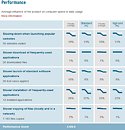
Microsoft Fixes Windows Defender Bug After Five Years of Firefox Slowdowns
Microsoft's Window Defender engineering team has finally found the time to address a long term bug within its anti-malware software - relating to performance issues with Mozilla's Firefox web browser. User feedback stretching back to five years ago indicates extremely sluggish web surfing experiences, caused by a Windows "Anti-malware Service Executable" occupying significant chunks of CPU utilization (more than 30%). The combination of Firefox and Windows Defender running in parallel would guarantee a butting of (software) heads - up until last week's bug fix. A Microsoft issued update has reduced the "MsMpEng.exe" Defender component's CPU usage by a maximum of 75%.
Microsoft and Mozilla developers have collaborated on addressing the disharmonious relationship between Defender and Firefox. A plucky member of the latter's softwareengineering team has been very transparent about the sluggish browser experience. Yannis Juglaret has provided a string of project updates via Mozilla's Bugzilla tracking system - one of his latest entries provide details about the fix: "You may read online that Defender was making too many calls to VirtualProtect, and that global CPU usage will now go down by 75% when browsing with Firefox. This is absolutely wrong! The impact of this fix is that on all computers that rely on Microsoft Defender's Real-time Protection feature (which is enabled by default in Windows), MsMpEng.exe will consume much less CPU than before when monitoring the dynamic behavior of any program through Event Tracing for Windows (ETW). Nothing less, nothing more."
Microsoft and Mozilla developers have collaborated on addressing the disharmonious relationship between Defender and Firefox. A plucky member of the latter's softwareengineering team has been very transparent about the sluggish browser experience. Yannis Juglaret has provided a string of project updates via Mozilla's Bugzilla tracking system - one of his latest entries provide details about the fix: "You may read online that Defender was making too many calls to VirtualProtect, and that global CPU usage will now go down by 75% when browsing with Firefox. This is absolutely wrong! The impact of this fix is that on all computers that rely on Microsoft Defender's Real-time Protection feature (which is enabled by default in Windows), MsMpEng.exe will consume much less CPU than before when monitoring the dynamic behavior of any program through Event Tracing for Windows (ETW). Nothing less, nothing more."



















